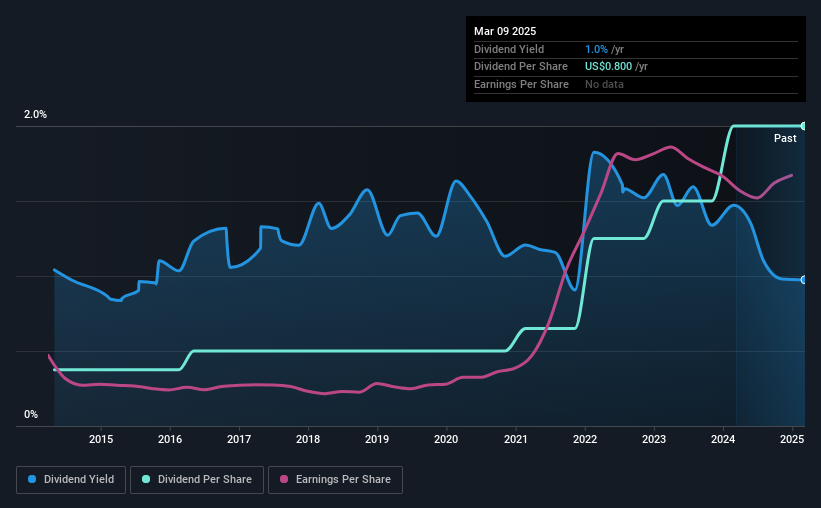Mueller Industries (NYSE:MLI) Could Be A Buy For Its Upcoming Dividend
It looks like Mueller Industries, Inc. (NYSE:MLI) is about to go ex-dividend in the next four days. The ex-dividend date occurs one day before the record date, which is the day on which shareholders need to be on the company's books in order to receive a dividend. The ex-dividend date is important as the process of settlement involves a full business day. So if you miss that date, you would not show up on the company's books on the record date. Meaning, you will need to purchase Mueller Industries' shares before the 14th of March to receive the dividend, which will be paid on the 28th of March.
The company's next dividend payment will be US$0.25 per share, and in the last 12 months, the company paid a total of US$0.80 per share. Based on the last year's worth of payments, Mueller Industries has a trailing yield of 1.0% on the current stock price of US$82.06. Dividends are a major contributor to investment returns for long term holders, but only if the dividend continues to be paid. So we need to investigate whether Mueller Industries can afford its dividend, and if the dividend could grow.
See our latest analysis for Mueller Industries
Dividends are typically paid from company earnings. If a company pays more in dividends than it earned in profit, then the dividend could be unsustainable. Mueller Industries paid out just 15% of its profit last year, which we think is conservatively low and leaves plenty of margin for unexpected circumstances. That said, even highly profitable companies sometimes might not generate enough cash to pay the dividend, which is why we should always check if the dividend is covered by cash flow. What's good is that dividends were well covered by free cash flow, with the company paying out 16% of its cash flow last year.
It's positive to see that Mueller Industries's dividend is covered by both profits and cash flow, since this is generally a sign that the dividend is sustainable, and a lower payout ratio usually suggests a greater margin of safety before the dividend gets cut.
Click here to see how much of its profit Mueller Industries paid out over the last 12 months.

Have Earnings And Dividends Been Growing?
Businesses with strong growth prospects usually make the best dividend payers, because it's easier to grow dividends when earnings per share are improving. Investors love dividends, so if earnings fall and the dividend is reduced, expect a stock to be sold off heavily at the same time. That's why it's comforting to see Mueller Industries's earnings have been skyrocketing, up 43% per annum for the past five years. Mueller Industries looks like a real growth company, with earnings per share growing at a cracking pace and the company reinvesting most of its profits in the business.
The main way most investors will assess a company's dividend prospects is by checking the historical rate of dividend growth. In the past 10 years, Mueller Industries has increased its dividend at approximately 18% a year on average. Both per-share earnings and dividends have both been growing rapidly in recent times, which is great to see.
Final Takeaway
Is Mueller Industries an attractive dividend stock, or better left on the shelf? Mueller Industries has been growing earnings at a rapid rate, and has a conservatively low payout ratio, implying that it is reinvesting heavily in its business; a sterling combination. It's a promising combination that should mark this company worthy of closer attention.
In light of that, while Mueller Industries has an appealing dividend, it's worth knowing the risks involved with this stock. Case in point: We've spotted 1 warning sign for Mueller Industries you should be aware of.
If you're in the market for strong dividend payers, we recommend checking our selection of top dividend stocks.
Have feedback on this article? Concerned about the content? Get in touch with us directly. Alternatively, email editorial-team (at) simplywallst.com.
This article by Simply Wall St is general in nature. We provide commentary based on historical data and analyst forecasts only using an unbiased methodology and our articles are not intended to be financial advice. It does not constitute a recommendation to buy or sell any stock, and does not take account of your objectives, or your financial situation. We aim to bring you long-term focused analysis driven by fundamental data. Note that our analysis may not factor in the latest price-sensitive company announcements or qualitative material. Simply Wall St has no position in any stocks mentioned.
 Wall Street Journal
Wall Street Journal